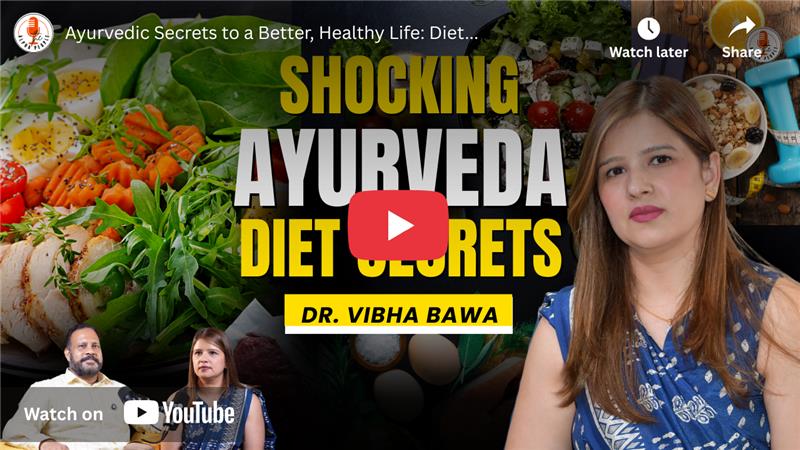In this podcast episode of The Alpha People, host Naveen Kumar Verma welcomes Dr. Vibha, an expert in Ayurveda and nutrition, who has been helping people improve their lifestyle and health for over 15 years. The discussion begins with how diet impacts daily living, and why portion control of home-cooked meals is essential. Dr. Vibha highlights the importance of balancing rice, roti, vegetables, pulses, and salads while ensuring adequate protein intake, which is often lacking in most Indian diets.
A major focus of the conversation is on weight management. Dr. Vibha explains that weight loss cases are more common than weight gain, though gaining weight is often more difficult due to factors like family history, hyperactive metabolism, or poor nutritional habits. She stresses that people with high metabolism should increase the gap between meals to allow the body to store nutrients, whereas frequent meals are more effective for weight loss. She also notes that modern problems such as childhood obesity and stunted growth often stem from poor dietary habits and lack of parental attention to children’s nutrition.
The podcast then dives into common lifestyle mistakes. Eating while watching TV or using mobile phones prevents the brain from receiving fullness signals, leading to overeating and digestive issues. Similarly, drinking tea or coffee with meals slows nutrient absorption, particularly iron, contributing to deficiencies and conditions like fatty liver. Dr. Vibha advises against combining fruits with meals, recommending instead that fruits be eaten alone at specific times of the day. She also stresses that salads should be consumed before meals, not mixed with them.
Another key highlight is the discussion on Ayurveda and modern lifestyle. Dr. Vibha explains that Ayurveda emphasizes prevention and root-cause healing, with guidelines like early rising, eating light after sunset, and practicing fasting. However, since modern work life and stress levels differ greatly from ancient times, she suggests a balanced approach—combining Ayurvedic principles with practical modern nutrition. She also emphasizes that packaged foods should be avoided as they contain harmful preservatives, while fresh, home-cooked meals are always the healthier option.
Health conditions such as bloating, diabetes, and PCOS/PCOD are also explored. Dr. Vibha notes that bloating is often linked to anxiety and fast eating, while diabetes, especially Type 2, can largely be reversed with proper diet and lifestyle changes. She underlines the value of desi cow ghee, which supports hormonal health, improves digestion, and even helps reduce stubborn fat, contrary to the myth that ghee is unhealthy. For women, she stresses that hormonal balance and reproductive health require sufficient healthy fats, which ghee provides.
Towards the end, Dr. Vibha shares practical and budget-friendly tips for better health, such as eating balanced home-cooked food, increasing water intake, practicing breathing exercises to reduce stress, and prioritizing protein for skin and hair health. She also highlights how excessive mobile use at night accelerates aging and wrinkles due to disturbed sleep patterns. Her core advice is simple yet powerful: “Think about yourself, take time for your diet, and treat food as your body’s true fuel.”
🔔 Don’t forget to subscribe & share if this conversation resonated with you!
🔔 Don’t forget to subscribe & share if this conversation resonated with you!
Frequently Asked Questions
Certainly! Here are some potential questions and answers based on the podcast conversation:
Yes, occasionally (once or twice a month) it’s fine, but it should not become a daily habit.
Losing weight is easier. Gaining weight is more difficult because it needs extra attention and time.
No. Food is your main source of energy. If your health is poor, your career and work also suffer. You can always plan simple and quick healthy options.
No. Tea acts as an anti-nutrient and blocks the absorption of iron and other nutrients.
Increase the gap between meals and include combinations of grains so the body starts storing nutrients instead of burning them too fast.
Too much junk food, lack of fruits/vegetables, and eating while watching TV or using mobile phones. These habits prevent proper digestion and make kids overeat.
Dinner should always be light because after sunset digestion slows down. Heavy dinners lead to obesity and health issues.
No. Packaged foods have preservatives and chemicals that are harmful. Fresh, home-cooked food is always the better choice.
Not at all. Cow ghee balances hormones, reduces stubborn fat, and is excellent for brain health.
Yes. Type 2 Diabetes (lifestyle-related) can be 100% reversed with proper diet, lifestyle changes, portion control, and stress management.






